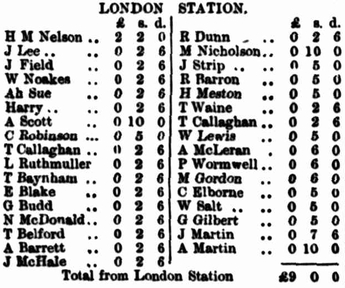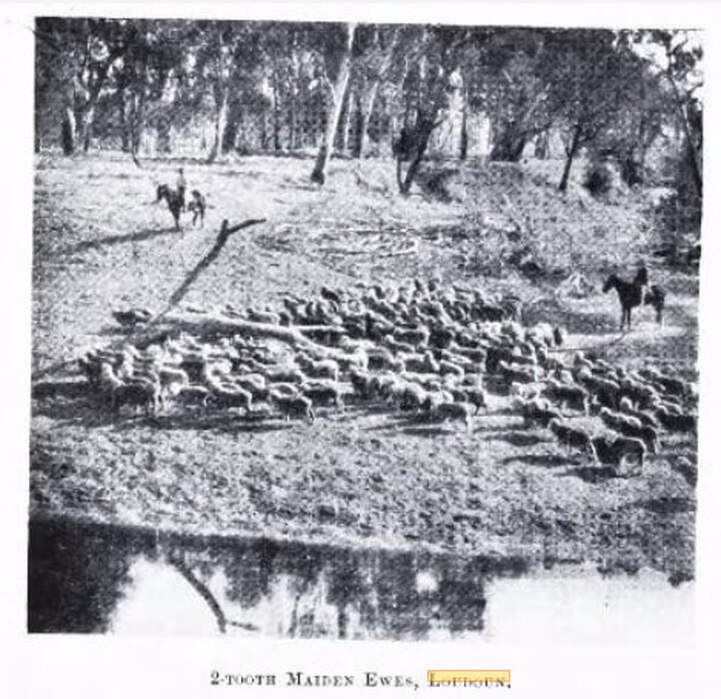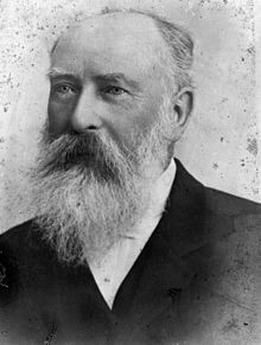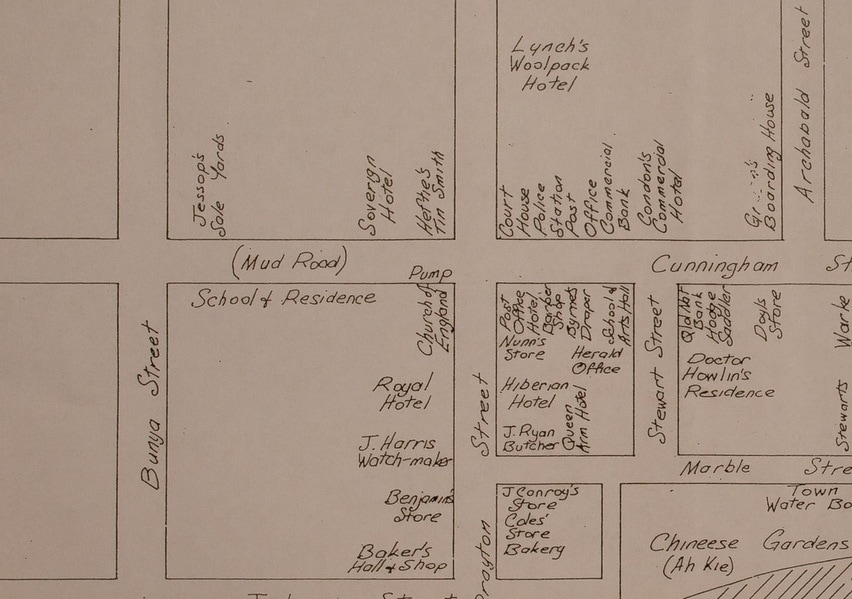Loudoun Station - sheep at the Condamine
Alexander McLaren 1849 - 1880
ON THIS PAGE - Major events in Alexander's life are listed below in chronological order.
SUBPAGE - Alexander's selections; other events in Alexander's life may be accessed via links on this page.
SUBPAGE - Alexander's selections; other events in Alexander's life may be accessed via links on this page.
Timeline of major events in the life of Alexander McLaren
1849 Born 13 Sep 1949 at Lechnicrieve in Campbeltown Parish.
1853 Emigrated to Moreton Bay aboard the America.
1863 Relocated with his parents from Ipswich to Dalby.
1868 Mother Jane McLaran's death, drowned in Myall Creek.
1874 Arrested on charges of deserting his daughter, the child of his (half) niece.
1874 Selected land near Ranges Bridge.
1875 Worked at Loudoun Station - see below.
1880 Alexander died following a fall from his horse in Cunningham Street, Dalby - see the inquiry below.
1956 Death of (possibly) Alexander's only child, Mary Jane Sullivan in Sydney.
1849 Born 13 Sep 1949 at Lechnicrieve in Campbeltown Parish.
1853 Emigrated to Moreton Bay aboard the America.
1863 Relocated with his parents from Ipswich to Dalby.
1868 Mother Jane McLaran's death, drowned in Myall Creek.
1874 Arrested on charges of deserting his daughter, the child of his (half) niece.
1874 Selected land near Ranges Bridge.
1875 Worked at Loudoun Station - see below.
1880 Alexander died following a fall from his horse in Cunningham Street, Dalby - see the inquiry below.
1956 Death of (possibly) Alexander's only child, Mary Jane Sullivan in Sydney.
Alexander McLaren, the only (known) child of Malcolm McLaran and his second wife, Jane McShennoig, was less than 4 years old when he arrived in Moreton Bay with his family aboard the America.
Alexander lived with his parents in Ipswich (1853 - 1865 approximately) and again on the banks of Myall Creek in 1868. In the 1870's he worked on stations around Dalby, such as Loudoun.
Alexander did not marry and has no acknowledged descendants. He selected land near Ranges Bridge 6 years prior to his tragic death in 1880, aged 30.
Alexander lived with his parents in Ipswich (1853 - 1865 approximately) and again on the banks of Myall Creek in 1868. In the 1870's he worked on stations around Dalby, such as Loudoun.
Alexander did not marry and has no acknowledged descendants. He selected land near Ranges Bridge 6 years prior to his tragic death in 1880, aged 30.
- 1849 Record of Alexander's birth - Campbeltown Parish

1875 List of hospital subscriptions from Loudoun (SIC) Station. Note the following names of interest:
|
Sir Hugh Nelson
|
5 Dec 1880 Alexander McLaren suffered fatal head injuries in a horse fall
Saturday 11 December 1880 Brisbane Courier
A man named Alexander McLaren was racing down Cunningham St, Dalby, on Saturday morning last, when his horse put his foot in the wheel track, and fell and rolled over his rider. The poor fellow died the same evening.
Saturday 11 December 1880 Brisbane Courier
A man named Alexander McLaren was racing down Cunningham St, Dalby, on Saturday morning last, when his horse put his foot in the wheel track, and fell and rolled over his rider. The poor fellow died the same evening.
Magisterial Enquiry
The enquiry was held the morning after Alexander's death, the day of his funeral. The first witness was the first man on the scene, Dr Bryn.
Dr Bryn's testimony
6 December 1880 Police Court, Dalby. Magisterial enquiry touching the death of Alexander McLaren. Before the Police Magistrate.
Archdall Edward Byrn sworn.
My name is Archdall Edward Byrn, I am a duly qualified Medical Practitioner and Health Officer of Dalby.
About nine o’clock yesterday morning I was being driven in my buggy near the School House – I saw three men pass so rapidly past me that the horse shied – I called after them. “That was no way to ride” – I looked round to my man driving, who said: “That man is killed”.
The man drove the buggy round, and I got down - Mrs Williams and one of the man’s mates was there when I got up to the man.
I raised his head and looked at him. His eyes were closed, lips immovable, and never moved his hands. There were no signs of life about him. I afterwards felt the pulse which beat slowly and I had him removed across the way to Mrs Williams’ verandah. I tried the usual remedies, cold water, and leaches to the head and gave directions what should be done.
I called again in a couple of hours. The pulse seemed improved and the breathing a little better. I called again at 3 PM the pulse seemed very much quicker and the pupils of the eye much dilated. I then formed a bad opinion of him and intended to call again at 6 pm but at 5 PM I heard that he was dead.
I believe the cause of death to be extravasation of blood and pressure on the brain.
By the Bench: I did not see the deceased fall - my man first called attention to the fact. There was not much appearance of drinking worth any of blame. Deceased might have had a few drinks - the road was very dangerous where they were riding.
(Signed) A E Byrne
Taken and sworn at the Police Office Dalby.
This sixth day of December 1880 before me.
(Signed) W Yaldwyn P.M
The enquiry was held the morning after Alexander's death, the day of his funeral. The first witness was the first man on the scene, Dr Bryn.
Dr Bryn's testimony
6 December 1880 Police Court, Dalby. Magisterial enquiry touching the death of Alexander McLaren. Before the Police Magistrate.
Archdall Edward Byrn sworn.
My name is Archdall Edward Byrn, I am a duly qualified Medical Practitioner and Health Officer of Dalby.
About nine o’clock yesterday morning I was being driven in my buggy near the School House – I saw three men pass so rapidly past me that the horse shied – I called after them. “That was no way to ride” – I looked round to my man driving, who said: “That man is killed”.
The man drove the buggy round, and I got down - Mrs Williams and one of the man’s mates was there when I got up to the man.
I raised his head and looked at him. His eyes were closed, lips immovable, and never moved his hands. There were no signs of life about him. I afterwards felt the pulse which beat slowly and I had him removed across the way to Mrs Williams’ verandah. I tried the usual remedies, cold water, and leaches to the head and gave directions what should be done.
I called again in a couple of hours. The pulse seemed improved and the breathing a little better. I called again at 3 PM the pulse seemed very much quicker and the pupils of the eye much dilated. I then formed a bad opinion of him and intended to call again at 6 pm but at 5 PM I heard that he was dead.
I believe the cause of death to be extravasation of blood and pressure on the brain.
By the Bench: I did not see the deceased fall - my man first called attention to the fact. There was not much appearance of drinking worth any of blame. Deceased might have had a few drinks - the road was very dangerous where they were riding.
(Signed) A E Byrne
Taken and sworn at the Police Office Dalby.
This sixth day of December 1880 before me.
(Signed) W Yaldwyn P.M
The scene of the accident.
Thomas Wright says he was passing the well (see "Pump" corner of Cunningham and Drayton Streets) when the accident happened approximately opposite "School & Residence".
Thomas Wright says he was passing the well (see "Pump" corner of Cunningham and Drayton Streets) when the accident happened approximately opposite "School & Residence".
Thomas Wright's testimony
Thomas Wright sworn.
My name is Thomas Wright, I am a groom residing in Dalby.
About 9 o’clock yesterday I was driving Dr Byrn up Cunningham Street - when passing by the well some horsemen went by - I think there were five - I recollect. I noticed the deceased Alexander McLaren amongst them.
He was the last of the five. He was going as fast as the horse would carry. He rode firmly and well seated. Had no appearance of being intoxicated, except the furious riding. After passing us by the Doctor made some remark, and when I turned round the man and horse were rolling on the ground - I saw the horse fall with deceased - I imagine the horse tripped in the rut - the ground is very broken where the accident happened - deceased was quite insensible - never saw him move until with the Doctor.
(Signed) Thomas Wright
Taken and sworn at the Police Office Dalby
This sixth day of December 1880 before me.
(Signed) W Yaldwyn P.M.
Thomas Wright sworn.
My name is Thomas Wright, I am a groom residing in Dalby.
About 9 o’clock yesterday I was driving Dr Byrn up Cunningham Street - when passing by the well some horsemen went by - I think there were five - I recollect. I noticed the deceased Alexander McLaren amongst them.
He was the last of the five. He was going as fast as the horse would carry. He rode firmly and well seated. Had no appearance of being intoxicated, except the furious riding. After passing us by the Doctor made some remark, and when I turned round the man and horse were rolling on the ground - I saw the horse fall with deceased - I imagine the horse tripped in the rut - the ground is very broken where the accident happened - deceased was quite insensible - never saw him move until with the Doctor.
(Signed) Thomas Wright
Taken and sworn at the Police Office Dalby
This sixth day of December 1880 before me.
(Signed) W Yaldwyn P.M.
Documents pertaining to Alexander's death
1. Inquest Certificate of Particulars
2. Part death certificate
3. Burials register Dalby
1. Inquest Certificate of Particulars
2. Part death certificate
3. Burials register Dalby
Questions and (possible) Answers:
Q1. Did alcohol play a part in Alexander McLaren's death?
A1. It is obvious that alcohol, perhaps a very late Saturday night, and reckless riding in dangerous conditions contributed to his death.
Q2. Why did the magistrate not call the other four riders to give evidence?
A2. It seems an oversight that the inquiry failed to call his fellow riders to give evidence. The part alcohol played in the accident was downplayed by Doctor Bryn and the magistrate.
Q3. Where did Alexander pass his final moments?
A3. Alexander was taken to his sister Catherine's home in Pratten Street, where he passed away eight hours later.
Q4. What were Alexander's burial arrangements?
A4. His brother-in-law James Milford, cabinet maker, probably attended to the cask. He was buried in the Church of England portion of the Dalby Monumental Cemetery very late (5PM) on the Monday afternoon without the presence of a clergyman.
Q5. In the death certificate, why did F.W. Roche refer to both Alexander and his father Malcolm as being “bushmen” and why is Alexander's age recorded as "28"?
A5. "Bushman" is a very apt description for both men, who spent their lives in the saddle and worked on rural properties outside Dalby. Alexander was 30 years and 7 months old approximately. Information for the certificate would have been provided most likely by Alexander's half-sister, Catherine Milford.... who was coincidently 28 years older. Stressful occasions often foster errors such as this.
Q6. What became of Alexander's selections?
A6. It is assumed that Donald, newly married and with commitments to both Kilkevan and Haran properties and a bank loan on the latter, passed up any opportunity to take over the the selection and the land reverted to the Crown.
Q7. Donald named his first born son after Duncan, who had died 7 months before. Why was the name "Alexander" not included as a name for one of Donald's other 4 sons?
A7. It is likely that Donald had lost patience with Alexander by the time of his death and decided to pass up the opportunity to honour him.
Q8. Is there a funeral notice or obituary for Alexander?
A8. When 1880 Dalby Herald is available online, we may find a very short obituary for Alexander McLaren.
Q1. Did alcohol play a part in Alexander McLaren's death?
A1. It is obvious that alcohol, perhaps a very late Saturday night, and reckless riding in dangerous conditions contributed to his death.
Q2. Why did the magistrate not call the other four riders to give evidence?
A2. It seems an oversight that the inquiry failed to call his fellow riders to give evidence. The part alcohol played in the accident was downplayed by Doctor Bryn and the magistrate.
Q3. Where did Alexander pass his final moments?
A3. Alexander was taken to his sister Catherine's home in Pratten Street, where he passed away eight hours later.
Q4. What were Alexander's burial arrangements?
A4. His brother-in-law James Milford, cabinet maker, probably attended to the cask. He was buried in the Church of England portion of the Dalby Monumental Cemetery very late (5PM) on the Monday afternoon without the presence of a clergyman.
Q5. In the death certificate, why did F.W. Roche refer to both Alexander and his father Malcolm as being “bushmen” and why is Alexander's age recorded as "28"?
A5. "Bushman" is a very apt description for both men, who spent their lives in the saddle and worked on rural properties outside Dalby. Alexander was 30 years and 7 months old approximately. Information for the certificate would have been provided most likely by Alexander's half-sister, Catherine Milford.... who was coincidently 28 years older. Stressful occasions often foster errors such as this.
Q6. What became of Alexander's selections?
A6. It is assumed that Donald, newly married and with commitments to both Kilkevan and Haran properties and a bank loan on the latter, passed up any opportunity to take over the the selection and the land reverted to the Crown.
Q7. Donald named his first born son after Duncan, who had died 7 months before. Why was the name "Alexander" not included as a name for one of Donald's other 4 sons?
A7. It is likely that Donald had lost patience with Alexander by the time of his death and decided to pass up the opportunity to honour him.
Q8. Is there a funeral notice or obituary for Alexander?
A8. When 1880 Dalby Herald is available online, we may find a very short obituary for Alexander McLaren.
Comment
An obituary for Alexander McLaren:
Alexander McLaren was born in Argyll in 1849, the only (surviving?) child of Malcolm McLaren and his second wife, Jane. He never married and had strong attachments to his mother and his eldest (half) sister, Catherine. He was present in Ipswich in 1858 when Catherine arrived from England pregnant with her second child (Malcolm Goodman).
In the mid-1860's, Alexander, his parents, Catherine and her son Malcolm Goodman moved to Dalby where his older brothers Donald and Duncan had been working for many years. He lived with his parents in a bark hut on a small allotment on Myall Creek, five km downstream from Dalby.
It was a traumatic moment in his life when in Dec 1868, Alexander (19) discovered the body of his mother drowned in Myall Creek. He rightly blamed his father for not being more caring. The inquest suggests he was devoted to his mother.
12 months later, his nephew Malcolm Goodman (10) passed away from "inflammation of the spine". The death certificate suggests that Malcolm Goodman may have been living with Alexander and Malcolm McLaran on the Myall Creek farm. This would have been another traumatic moment for Alexander.
In the early 1870's, Alexander became an independent man as Malcolm moved from Myall Creek, residing sometimes at Donald's Frogmore selection and perhaps with the Milfords. He worked at Loudoun and in 1874 followed Donald's lead by selecting land near Ranges Bridge. This was a bold move.
Drama continued to follow Alexander when he was arrested in 1874. He was charged with failing to financially support his alleged illegitimate child, the daughter of his 18 year old (half) niece Ellen Sullivan. Published court reports on this event contain little detail but suggest that with no defence apart from strongly swearing his innocence, Alexander was fortunate to be absolved of any responsibility.
Alexander's alcohol-fueled death occurred as he was starting to make his way in the world by selecting land past Ranges Crossing. The deaths of Margaret (1874), Duncan (1879) and then Alexander would have been devastating for Malcolm McLaran in his final years. However, it appears Malcolm developed senility around 1877 and may have been spared the trauma of the last 2 deaths.
The Legacy of Alexander McLaren
Alexander McLaren left no obvious legacy ... unless of course he was the father of Mary Jane Sullivan. If so, his Coss family descendants live on to this day in New South Wales.
An obituary for Alexander McLaren:
Alexander McLaren was born in Argyll in 1849, the only (surviving?) child of Malcolm McLaren and his second wife, Jane. He never married and had strong attachments to his mother and his eldest (half) sister, Catherine. He was present in Ipswich in 1858 when Catherine arrived from England pregnant with her second child (Malcolm Goodman).
In the mid-1860's, Alexander, his parents, Catherine and her son Malcolm Goodman moved to Dalby where his older brothers Donald and Duncan had been working for many years. He lived with his parents in a bark hut on a small allotment on Myall Creek, five km downstream from Dalby.
It was a traumatic moment in his life when in Dec 1868, Alexander (19) discovered the body of his mother drowned in Myall Creek. He rightly blamed his father for not being more caring. The inquest suggests he was devoted to his mother.
12 months later, his nephew Malcolm Goodman (10) passed away from "inflammation of the spine". The death certificate suggests that Malcolm Goodman may have been living with Alexander and Malcolm McLaran on the Myall Creek farm. This would have been another traumatic moment for Alexander.
In the early 1870's, Alexander became an independent man as Malcolm moved from Myall Creek, residing sometimes at Donald's Frogmore selection and perhaps with the Milfords. He worked at Loudoun and in 1874 followed Donald's lead by selecting land near Ranges Bridge. This was a bold move.
Drama continued to follow Alexander when he was arrested in 1874. He was charged with failing to financially support his alleged illegitimate child, the daughter of his 18 year old (half) niece Ellen Sullivan. Published court reports on this event contain little detail but suggest that with no defence apart from strongly swearing his innocence, Alexander was fortunate to be absolved of any responsibility.
Alexander's alcohol-fueled death occurred as he was starting to make his way in the world by selecting land past Ranges Crossing. The deaths of Margaret (1874), Duncan (1879) and then Alexander would have been devastating for Malcolm McLaran in his final years. However, it appears Malcolm developed senility around 1877 and may have been spared the trauma of the last 2 deaths.
The Legacy of Alexander McLaren
Alexander McLaren left no obvious legacy ... unless of course he was the father of Mary Jane Sullivan. If so, his Coss family descendants live on to this day in New South Wales.



